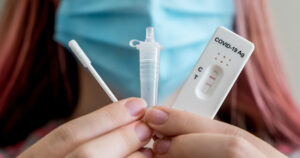 Introduction
Introduction
Amidst the evolving landscape of medical technology, laboratory developed tests (LDTs) have emerged as a pivotal yet often overlooked component, shaping diagnostic practices with their versatility and significance. Some estimates put laboratory developed tests at half of the total number of in vitro diagnostics devices in use in 20221. Thanks to the COVID pandemic, accurate laboratory developed tests, like those that detect SARS-CoV-2, are more important than ever.
What Are Laboratory Developed Tests?
Laboratory developed tests, or LDTs, are tests developed and used in a single laboratory to measure or detect disease in humans. They are used by medical professionals to make healthcare decisions for patients.
LDTs fall under the subset of in vitro diagnostic devices (IVDs). IVDs are a class of products that are made up of the instruments, systems, and laboratory solutions used to diagnose various diseases or conditions2.
LDTs can be as simple as complete blood count (CBC) test, used to detect information about the blood3, or they can be incredibly complex, such as a cancer predictive4.
LDTs are widely used in healthcare, with up to 70% of healthcare decisions depending on LDT results5. In the early days, the 70s and 80s, LDTs were typically simple tests created at the local hospital or doctor’s office, presenting little risk to the patient6. However, in the age of the internet and modern travel, the risk has escalated due to the proliferation of LDTs developed with minimal oversight.
Why LDTs Matter to Everyone
Since COVID, most Americans have experience with at least one LDT – the COVID-19 test kit. The US government purchased one billion at-home rapid COVID-19 tests in January 2022, allowing Americans to order four free tests per household7.
Another LDT that many Americans are familiar with is the DNA test, such as those offered by direct to consumer genetic testing companies. In addition to learning about one’s ancestry, some companies offer these tests as a means to learn more about one’s genetic background8.
Need for regulation
Because of the rapid increase of LDTs marketed directly to consumers, the FDA is revamping how it regulates LDTs. The FDA plans to regulate them by risk, copying the classes of risks used for medical devices9.
For low-risk class I LDTs, the FDA will enforce registration and listing requirements, as well as adverse event reporting; only requiring the regulations listed under CFR 820 General Controls. For high-risk classes of LDTs, the FDA will require additional documentation, like post-market review.
The FDA rule was announced on September 29, 2023 and will be implemented in a staged approach:
- Stage 1 (1 year) Adverse event reporting is required for all LDTs
- Stage 2 (2 years) All LDT’s are required to be listed with the FDA
- Stage 3 (3 years) Quality Management System is required for all manufacturers
- Stage 4 (October 2027) Premarket review is required for all high-risk LDT’s
- Stage 5 (April 2028) Premarket review is required for all medium & low-risk LDT’s
Conclusion
Laboratory developed tests (LDTs) play a crucial role in modern healthcare, providing invaluable insights for medical professionals and patients alike. From routine screenings to complex predictive tests, LDTs have become an integral part of the MedTech landscape.
However, the proliferation of LDTs underscores the need for robust regulatory oversight to ensure their safety and efficacy. If you are seeking to optimize your LDT or ensure compliance with evolving regulatory standards, contact us at quality@cannonqg.com.
References
- Laboratory Developed Tests Market Size & Share Report, 2030. www.grandviewresearch.com. https://www.grandviewresearch.com/industry-analysis/laboratory-developed-tests-market-report
- Health C for D and R. Overview of IVD Regulation. FDA. Published online September 16, 2019. https://www.fda.gov/medical-devices/ivd-regulatory-assistance/overview-ivd-regulation
- National Library of Medicine. Complete Blood Count (CBC): MedlinePlus Lab Test Information. Medline Plus. Published 2018. https://medlineplus.gov/lab-tests/complete-blood-count-cbc/
- Califf, M.D. RM. AHA Letter to the FDA on Laboratory Developed Tests (LDTs) Proposed Rule | AHA. www.aha.org. Published January 19, 2024. https://www.aha.org/lettercomment/2023-12-01-aha-letter-fda-laboratory-developed-tests-ldts-proposed-rule
- Health C for D and R. FDA and CMS: Americans Deserve Accurate and Reliable Diagnostic Tests, Wherever They Are Made. FDA. Published online January 18, 2024. https://www.fda.gov/medical-devices/medical-devices-news-and-events/fda-and-cms-americans-deserve-accurate-and-reliable-diagnostic-tests-wherever-they-are-made
- Health C for D and R. Laboratory Developed Tests. FDA. Published February 9, 2019. https://www.fda.gov/medical-devices/in-vitro-diagnostics/laboratory-developed-tests
- House TW. Fact Sheet: The Biden Administration to Begin Distributing At-Home, Rapid COVID-19 Tests to Americans for Free. The White House. Published January 14, 2022. Accessed March 18, 2024. https://www.whitehouse.gov/briefing-room/statements-releases/2022/01/14/fact-sheet-the-biden-administration-to-begin-distributing-at-home-rapid-covid-19-tests-to-americans-for-free/#:~:text=To%20help%20ensure%20Americans%20have
- Fox M. I took a batch of DNA tests so you don’t have to. NBC News. Published June 13, 2018. https://www.nbcnews.com/health/health-news/i-took-batch-dna-tests-so-you-don-t-have-n880386
Health C for D and R. Framework for Regulatory Oversight of Laboratory Developed Tests (LDTs). U.S. Food and Drug Administration. Published May 14, 2019. https://www.fda.gov/regulatory-information/search-fda-guidance-documents/framework-regulatory-oversight-laboratory-developed-tests-ldts

